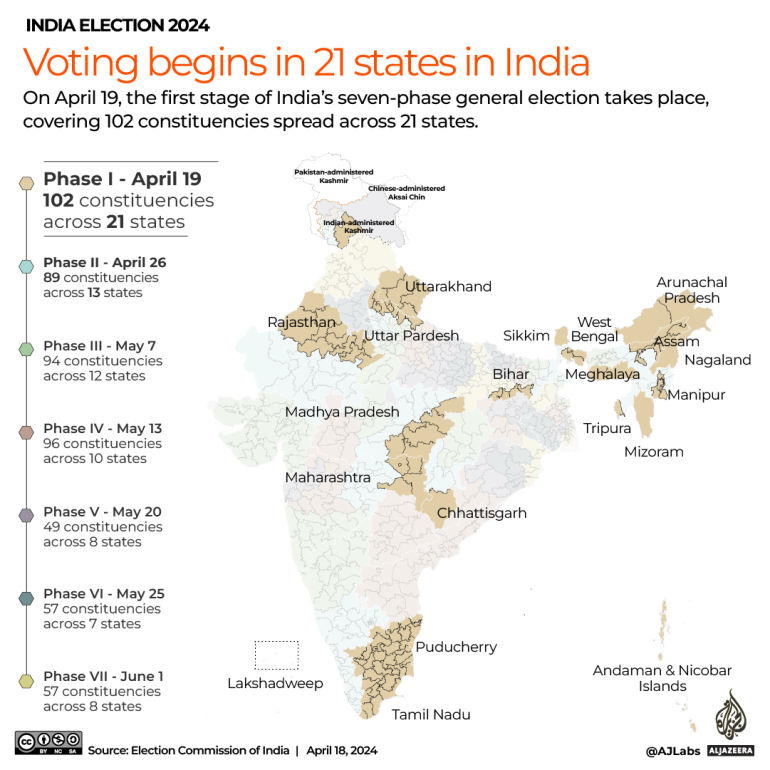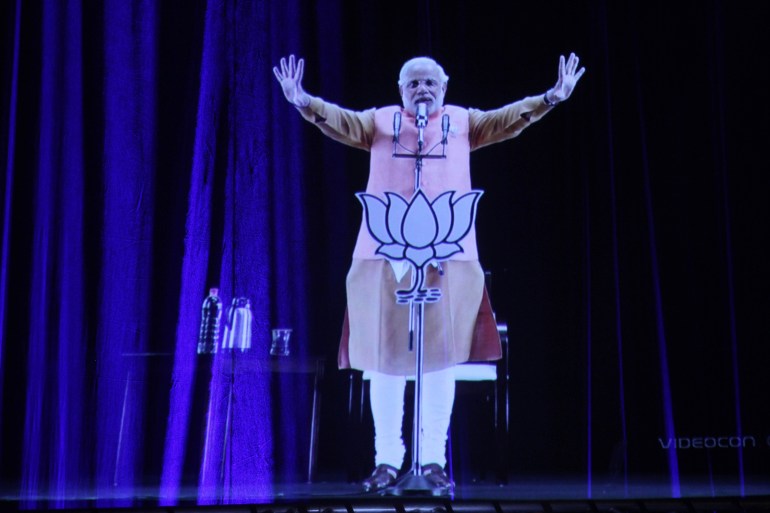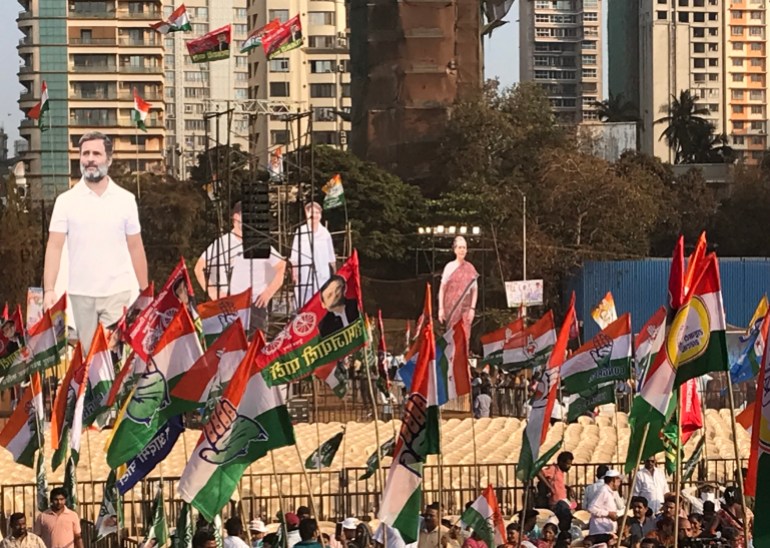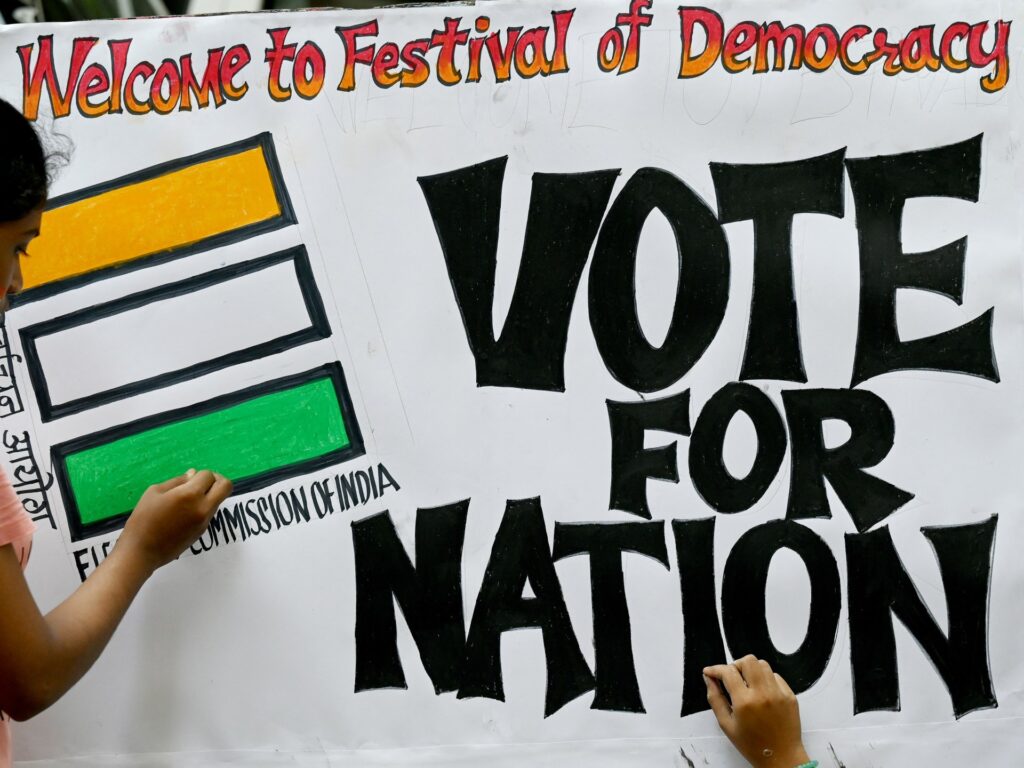Millions of Indians voted in the first phase of the world's biggest election, as Prime Minister Narendra Modi seeks a third term on a platform of issues such as growth, welfare and Hindu nationalism.
The vote puts Prime Minister Narendra Modi's Bharatiya Janata Party (BJP) at odds with a coalition of 20 opposition parties that has pledged to expand affirmative action and increase benefits, while stressing the need to save democratic institutions. .
Before voting closed on Friday, the Election Commission said turnout ranged from 40% in the vast northern state of Bihar to 68% in the small northeastern state of Tripura. In the 2019 multi-stage poll, the average turnout was 67 percent.
“I urge everyone who votes… to exercise their right in record numbers,” Prime Minister Modi posted on social media platform X before voting began.
In a statement on X, the main opposition party, the Indian National Congress, appealed to voters to end “hatred and injustice”.

Approximately 969 million people have registered to vote in the six-week election, including 18 million first-time voters and 197 million in their 20s. This would make India's electorate larger than the population of the 27 European Union countries combined.
winding line of voters
Friday's voting was the first of seven phases, covering 102 constituencies in 21 states and territories, from the southern state of Tamil Nadu to Arunachal Pradesh on the Himalayan border with China. . Voters also turned out in droves to vote in the violence-hit northeastern state of Manipur, where ethnic clashes have left at least 220 people dead over the past year.
Voters patiently gathered in long, winding lines outside polling stations in Haridwar, a Hindu holy city on the banks of the Ganges River, before polling stations opened.
“I'm here because I'm happy with the direction this country is heading in,” autorickshaw driver Ganga Singh, 27, told reporters. “I vote with the welfare of the nation in mind, not the welfare of individuals.”
Voting was done using electronic voting machines. Voters pressed a blue button that corresponded to their chosen candidate's serial number, name, and symbol, or selected the option “None of the Above.”

According to Indian media, the voting process was largely peaceful, but voting was quickly suspended in Manipur state due to allegations of fraud. A paramilitary security officer was also injured in an “accidental” explosion in central Chhattisgarh's Bijapur district, according to reports citing police sources.
Mr. Modi vs. Opposition
Polls show that the Bharatiya Janata Party will easily win a majority in India's parliament, despite voters' concerns about unemployment, inflation and rural poverty.
For Muhammad Shabir, a Muslim voter from Kairana in the northern state of Uttar Pradesh, his biggest concern was jobs. The 60-year-old driver says none of his eight children have regular jobs.
“Even Hindus are affected by the lack of jobs,” he told Reuters, arguing that the problem outweighed the appeal of Hindu nationalism in the Hindu-majority country.
In Tamil Nadu, where the BJP is weak, voters appear to be divided on whether Mr. Modi's strong push this time around will benefit the party.
S. Rajagopal, a three-wheeler taxi driver in the state capital Chennai, told Reuters, “The Bharatiya Janata Party's vote share may not increase in Tamil Nadu, but nationally, Mr. Modi will again win decisively.'' Deaf,” he said.

Since Mr. Modi came to power, attacks on minorities, mainly Muslims, and allegations of gags against freedom of speech and media are among the issues likely to influence the election.
The Modi government is “controlling Muslims,” Ramesh Chand, a Hindu biscuit baker from Kairana, near Muzaffarnagar, told local media.
BJP is confident
BJP spokesperson Mohan Krishna expressed confidence that the party will win the elections with a landslide.
“The opposition is in disarray,” he told Al Jazeera.
Modi's “welfare system and…corruption-free government” have given “immeasurable satisfaction and confidence to the people”.
Mr. Krishna also called the allegations of democratic backsliding under the Modi government “absolute nonsense.”
“The Bharatiya Janata Party values democracy and the constitution and we have proven that in the last 10 years,” he said.
But some Bharatiya Janata Party insiders and analysts said the party was concerned about complacency and overconfidence among voters and members and needed to get more people to vote.

The opposition party National Comprehensive Alliance for Development (India), to which the Congress party belongs, has criticized the Bharatiya Janata Party for rising unemployment and corruption, while also disputing the government's statements on inflation statistics.
“The Opposition’s manifesto also focuses on key social justice pillars of unemployment, women’s emancipation, minimum support prices for farmers, and inclusive growth, which the Bharatiya Janata Party has not done. No,” said Congress spokesperson Anshul Abhijit. Al Jazeera.
But the Indian alliance has struggled to build unity. The government has accused it of hindering government efforts by arresting leaders in corruption cases and imposing huge taxes on political parties before voting, charges the government denies. ing.
Abhijit said the opposition believes in democracy and the power of the Indian people and will rise up against the ruling party that has undermined India's electoral system.

The second phase of the marathon election will be held on April 26, with 89 seats contested in 13 states.
The next round of voting will take place on May 7th for 94 seats in 12 states. On May 13th, 96 seats in 10 states will be decided, and on May 20th, voters will vote on 49 seats in eight states.
The May 25th phase will target 57 seats in seven states, and the final phase on June 1st will see voting take place in 57 constituencies in eight states.

